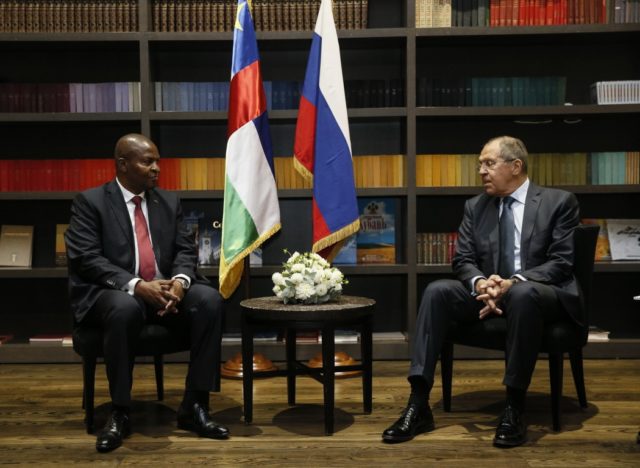
Putin Now Pursuing Multiple Long-Term Goals in Central Africa
Publication: Eurasia Daily Monitor Volume: 15 Issue: 121
By:

Shocking news at the end of July of the murder of three independent Russian journalists investigating the activity of a Russian private defense company in the Central African Republic (CAR) was followed a month later with the signing of a military cooperation agreement between that country and Russia (Ekho Moskvy, August 21). Together, these and other mounting developments coming out of Central Africa have been raising the question of what Moscow is presently doing in a region it had never devoted much attention to in the past—either in Soviet times or more recently. The answer seems to reflect a combination of geopolitical and economic interests that has routinely come to characterize Russian President Vladimir Putin’s approach to international affairs.
Three Moscow-based Africa scholars, Vadim Zaytsev, Andrey Maslov and Yuliya Timofeyeva, seek to downplay the Russian role in the CAR and Central Africa more generally; but their joint article on the subject, which first appeared on the site of the Carnegie Moscow Office and then in Novyye Izvestiya, in many ways undercuts their conclusion. Rather, their piece inadvertently suggests that the Kremlin is playing a long game in the troubled waters of this country and region for Russia’s own economic and political interests there—and against those of Europe, the United States and China (Carnegie.ru, August 10; Novyye Izvestiya, August 13).
In support of their conclusion, Zaytsev, Maslov and Timofeyeva cite that Moscow does not now have “any major business projects” in the Central African Republic at the present time and that it has offered the services of its private military companies only to help the government in Bangui restore order domestically. Reportedly, the CAR agreed to this arrangement for several reasons. First, because Russian services are cheaper—although, the authors conspicuously do not consider the possibility that Moscow is subsidizing these security services to ensure their economic competitiveness. Second, they are not European, with Europe’s colonial past, nor American, nor Chinese, with the latter’s neo-imperial agenda. And third, they argue, because the Russian presence has the support of the Africans and the United Nations.
The Central African Republic, Zaytsev et al. write, is hardly an attractive place for any outsider, including Russia. It is poor, landlocked, and divided among more than a dozen competing military groups. Most of its people are nominally Christian, reflecting the country’s past as a French colony. But the Muslims, who number only 15 percent of the population, nonetheless control approximately half of the territory, including some of the CAR’s most important economic sites, such as diamond, gold and uranium mines. The current regime can thus best be described as a failed state, they argue.
Numerous local CAR combatants have been accused of crimes against humanity and placed on international sanctions lists. Thus, many countries are reluctant to become involved on any of the sides, the Russian scholars continue. Yet, Zaytsev, Maslov and Timofeyeva ignore the fact that it is precisely in such troubled places that the Putin regime has sought to leverage its relative weakness into future strength.
The three Russian Africanists correctly note that “the interests of Russia [in Africa] have lain to the north (the post-socialist Arab regimes) and northeast (Sudan and Ethiopia) or to the south, the regimes in the Union of South Africa, Namibia, and Angola which arose out of anti-colonial wars and the struggle with apartheid.” Central Africa, including both the Central African Empire and its successor, the Central African Republic, remained “until recently,” the three say, “on the periphery of the political and economic interests of the USSR [Union of Soviet Socialist Republics] and Russia.”
But in the last year, that has changed, they acknowledge. The CAR’s President Faustin-Archange Touadéra has met with Russian Foreign Minister Sergei Lavrov, in Sochi, in October 2017, and with Vladimir Putin, in May 2018, in St. Petersburg. Moreover, Russians have secured an exemption from the UN embargo on supplying the CAR with guns and military trainers, and Russia has already begun implementing such arms deals. In March 2018, Moscow announced that it was studying “mutually profitable” mining concessions in the CAR; and in July, it was given permission to develop the gold mines there in exchange for providing security.
Russia dispatched 170 private military company instructors as well as a more limited contingent of its own military personnel. But more important as an indication of growing Russian influence in the CAR was something else that has not yet attracted much attention in the West: The CAR president agreed to have a Russian citizen, Valery Zakharov, become his national security advisor. Specifically, Zakharov will now oversee both negotiations with various armed groups as well as the exploitation of the country’s natural resources.
Despite this fact, the three Moscow-based Africa experts say, suggestions that Russia now has “decisive influence in the CAR” is “at a minimum an exaggeration.” On the one hand, that is perhaps correct as far as it goes: In the troubled situation in the CAR now, no one has “decisive influence.” But on the other hand, Russia has positioned itself to direct the CAR government and, more importantly, deny access to other outside powers while gaining access for itself to the mineral wealth of the country when conditions permit. This is, thus, a classic example of Putin’s “hybrid” approach, which combines both overt and covert operations and seeks both geopolitical and economic profit.
In the short term, Moscow may not be a big winner; but in the longer term, even the three Russian analysts concede, “the presence of Russian forces in the CAR could be transformed into a political project” that would give Moscow a new base of operations in Africa and new profits from the exploitation of the mineral wealth of others.



